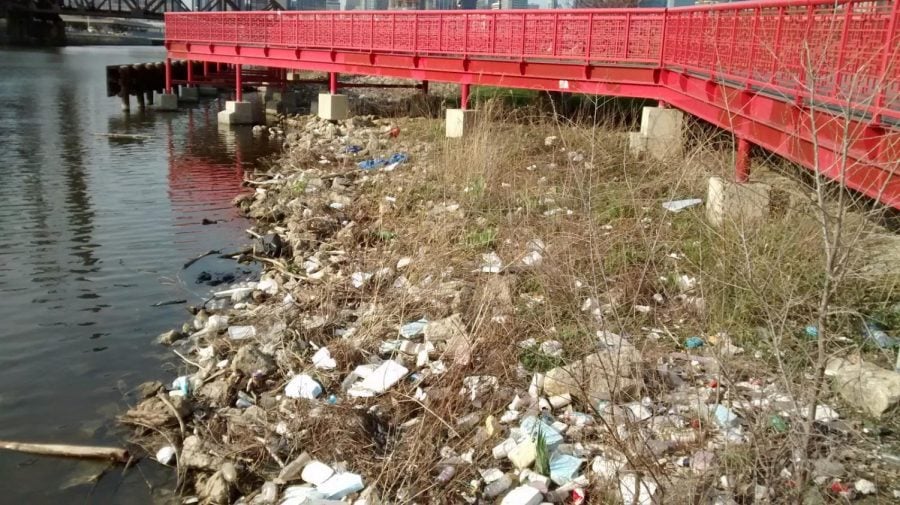Lake Michigan plastic pollution poses ecological and social threats
Plastic pollution in an Illinois waterway. With millions of pounds of plastic entering Lake Michigan annually, conservationists are pushing for changes at all levels to address the problem.
January 28, 2021
As advocates push for clarity within Evanston’s Climate Action and Resilience Plan, local researchers and advocates are raising alarm about the growing social and ecological effects of plastic pollution in Lake Michigan.
According to a study from the Rochester Institute of Technology, 11 million pounds of plastic – the equivalent of 100 Olympic-sized swimming pools full of plastic bottles – are entering Lake Michigan each year. Scientists say this plastic threatens the lake’s wildlife and ecosystems, as well as the over 10 million people who rely on it for drinking water.
“We’re starting to see (plastic) creep into a lot of different parts of the food web,” Jaclyn Wegner, the director of Conservation Action at the Shedd Aquarium, said.
She said that plastic entering aquatic ecosystems doesn’t biodegrade, but rather breaks down into smaller pieces, known as microplastics, that are so tiny they can pass through water filtration systems and be mistaken for food by fish and other wildlife.
Wegner said that plastic ingested by wildlife causes internal damage and can introduce toxins into the food web. A study conducted by the conservation group Friends of the Chicago River found that 93 percent of fish in the Chicago area have “some form of plastic present inside them.”
Accumulation of plastics isn’t only contained within aquatic ecosystems. A World Wildlife Fund study found that, globally, the average person consumes about five grams of microplastics each week – the equivalent of a credit card. This plastic can come from seafood, such as fish with plastic accumulated in their bodies, but it’s also present in water systems.
Although microplastics’ impacts on human health are largely unknown, they represent a growing area of concern among researchers and public health organizations.
“Plastic pollution… is a consumption problem,” Tyrone Dobson, the volunteer engagement manager at the Alliance for the Great Lakes, said. “We as a people consume more plastic, and most of that plastic… is single-use plastics.”
Dobson said recycling isn’t a foolproof solution to plastic waste. According to a 2020 Greenpeace report, most plastics aren’t regularly recycled, and even when they are, they can only be repurposed once or twice into new products. In contrast, glass and metals can be recycled indefinitely.
To address plastic pollution, the Alliance for the Great Lakes sponsors beach clean-up events, where Dobson said 85 to 90 percent of the waste volunteers pick up is plastic.
But Anna-Lisa Castle, a water policy manager at the Alliance, said beach clean-ups aren’t enough to solve the problem.
“Interventions are needed all along the supply chain,” she said. “Limiting plastic pollution is something that should be part of doing business, and that burden does not just fall on consumers.”
At the state level, Illinois representatives proposed the “Plastic-Free Water for Illinois” platform in 2020, a comprehensive package of legislation that would ban plastic foam, reduce the use of plastic serviceware at restaurants and tax plastic bags.
In Evanston, reducing plastic pollution is part of CARP’s zero-waste goal by 2050, but the city has yet to take concrete steps in that direction.
Evanston Environment Board member Michelle Redfield said a ban on single-use plastics is being considered at the city level, but not officially on the city’s agenda.
“The city has not yet developed a zero-waste strategy, yet they’re moving forward in some really impactful ways,” Redfield said.
The city’s agenda for 2021 includes proposing an update to the 2015 “Shopping Bag Ordinance” as well as propositions for universal composting and recycling, Redfield said.
But advocates stressed that solutions to plastic pollution need to be inclusive and shouldn’t place disproportionate burdens on lower-income residents, people with disabilities or small business owners. Wegner said single-use container bans should include subsidies to help small restaurants transition to compostable or reusable containers.
Beyond policy solutions, many advocates said that addressing plastic pollution requires a fundamental transformation of cultural norms about waste.
“The plastic pollution problem that we have is very closely aligned (with)… the idea that people and places and water can be treated as disposable,” Castle said. “We need our economy to work in a way that things get reused and that pollution is not just an acceptable externality.”
Email: [email protected]
Twitter: @willsclark01
Related Stories:
— Invasive species, extreme weather pose threat to Lake Michigan, report finds












